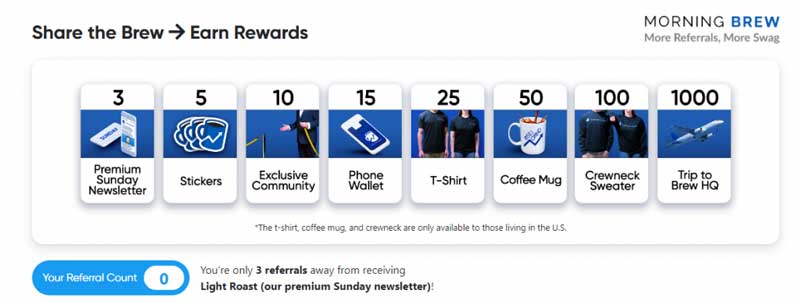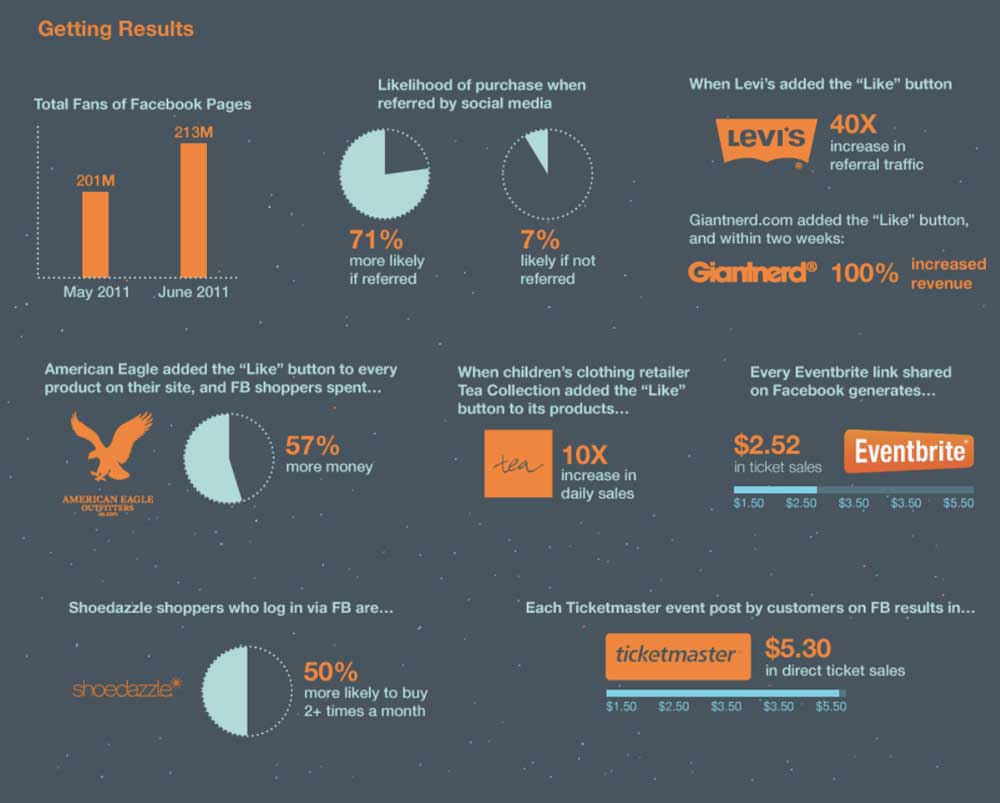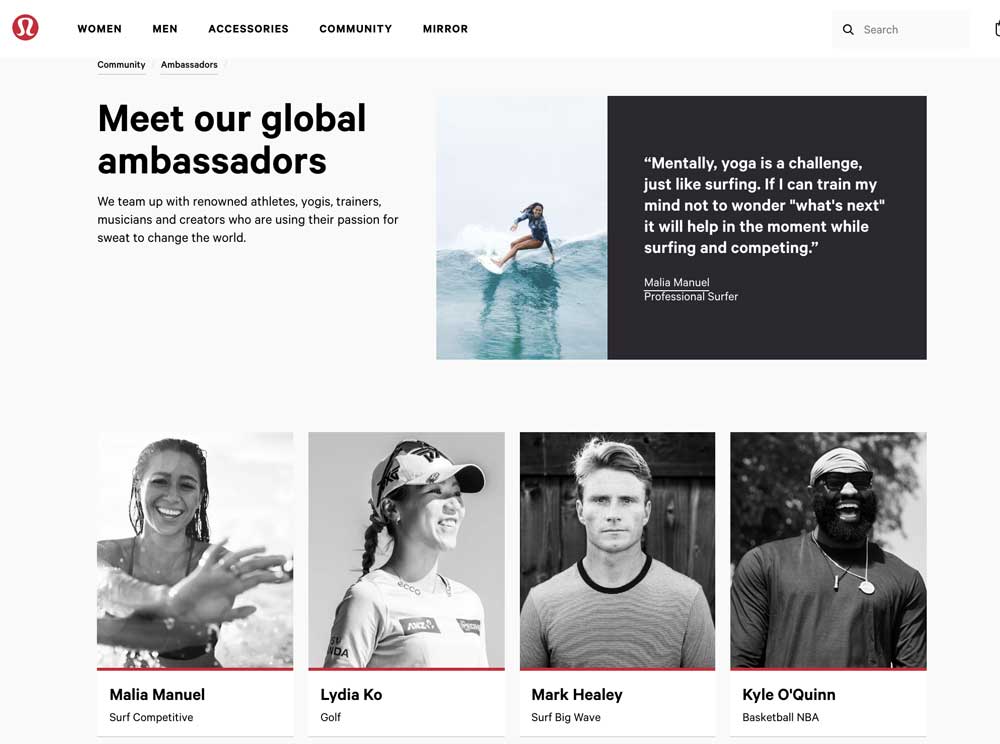A referral program sounds simple enough. It’s a system that brings your business new customers through personal recommendations.
The question is, why do referral programs work? How does word of mouth help your business?
Not only will referral marketing encourage customers to talk about your business, the process of building and managing a program results in a stronger relationship with customers.
You’ll discover your most passionate brand advocates, what exactly they like about your products, and the best ways to build long-term customer loyalty.
What’s the point of a referral program?
Digital marketing pioneer Ann Handley states: “We’re past the age where if you build it, they will come. You have to have some sort of promotional program in place.”
A referral program is one of the most effective ways to promote your business. Instead of waiting for random word of mouth, a formal referral program streamlines and scales the entire process.
By asking customers to share your brand with others, you’re able to generate warm leads who are more likely to make a purchase. And then by rewarding these customers for their referrals, you’re successfully engaging your best advocates.
In the long run, a referral program generates automated growth for your business, bringing in a steady flow of new leads and fostering a strong relationship with existing customers.
Why referral programs work?
Referral programs work because they’re a direct and authentic way to spread word about your business. Unlike traditional mass forms of marketing, referral marketing programs motivate existing customers to share your products and services with their network.
Since customers already use and enjoy your product, they’re able to share their personal experience with friends and family. They also likely know others who share their same needs and pain points, and therefore in the market for your offering.
Of course, a main feature of why referral programs work is the reward incentive. Giving customers a token of thanks for referring others is a great way for businesses to show appreciation. (And when a reward is also offered to the referred lead, it increases the odds of them making their first purchase and becoming a customer.)
For example, email newsletter Morning Brew offers a variety of rewards to subscribers who refer others to the newsletter.
16 reasons why you need a referral program
Aside from leads and sales, a referral program brings a wealth of benefits. Here are 16 reasons why a referral program is beneficial for businesses:
1. Encourages customers to share
About 83% of customers are willing to refer after a positive experience. However, only 29% actually do. A referral program can motivate customers to action with timely messages and attractive rewards.
It’s best to invite customers to your program during what’s called “aha” moments, or when they experience the most value from your brand. For example, right after making a purchase or after receiving their product in the mail. You can also provide a pre-filled message that makes it easy for them to share in just a few clicks.
And of course, offering an attractive reward is a great way to encourage referrals and show customers you appreciate their support.
2. Boosts the referrals you’re already getting
Are customers already referring others to your brand? If you find new customers are hearing about you from your existing base, it’s a good sign that your business is ready for a referral program. A formal process with easy messaging options and attractive incentives can grow the referrals you’re already receiving.
You can start by trying out a referral program the manual way, by using manual referral tracking and spreadsheets. Or you can easily test out referral marketing software that streamlines and automates the process and gets customers sharing right away.
3. Fosters greater trust in your market
A study by Nielsen reveals 92% of consumers are more inclined to trust personal recommendations over traditional marketing. This includes reading reviews, testimonials, and of course, hearing about new products from friends and family.
Consumer trust is becoming even more important, as people are becoming desensitized to mass marketing ads and even using ad-blockers to prevent them from popping up when they’re online.
With so many ads trying to grab our attention, an authentic recommendation from someone who’s already tried the product or service can be an invaluable way to cut through all the noise.
4. Gains presence on the same platforms as potential customers
A referral program enables your customers to share on the platforms they use most, which makes it one of the easiest campaigns to promote.
Every customer in your program is given a referral link they can easily send to their friends and family. Most referral software will also offer a variety of templates that can be shared through Twitter, Facebook, and other popular social media platforms.
Just how effective are referral programs? Studies reveal 71% of consumers are more likely to make a purchase if they were referred on social media. And with millions of messages sent online every minute, a business has to be present and promote on the digital platforms its potential customers use most.
5. Invites customers to feel like part of your business
Want your customers to have a deeper connection with your brand? Invite them to join your referral program.
Customers who are already fans of your brand will enjoy contributing to your success. They’ll also be proud of sharing such a great product with others who may not have heard of you yet.
Referral programs also present the opportunity for customers to get exclusive rewards, like access to private sales and events, branded swag, or even pre-release products they can try before anyone else.
6. Gauges how well your business is really doing
Not even the most loyal customer will send referrals if they’re unsatisfied with your product and service. People won’t risk their own reputation and social currency to promote a questionable brand.
The fact that a customer refers others and speaks well of your business is already a great sign. If you have customers who are actively sharing your brand and participating in a referral program, it’s a good indication your business is on the right track.
7. Reminds customers why they love your brand
When a customer refers someone to a certain product or service, they usually share why they prefer your brand – why purchasing from your business is the best option.
This conversation reinforces a customer’s feelings toward your brand (even more if they refer several others). And if their referrals end up becoming new customers, they’ll all have a shared interest in your brand.
8. Drives repeat customer purchases
A referral program naturally increases the number of repeat purchases for your business. The most popular incentives are cash-based, such as store credit and discounts. These are all rewards that go toward a customer’s next purchase.
By making it easy to continue purchasing from your company, a referral program not only invites new customers, but also encourages existing ones to stay loyal.
9. Increases overall customer engagement
An added benefit of referral marketing is it builds a strong online presence for your business. Most referrals will want to learn more about your brand and products before making a purchase, which means they’re actively visiting your website and social media pages.
Along the same lines, your existing customers will also frequent your website to check their referral points or reward status. Increased visits to your site naturally leads to an increase in brand awareness and potential sales, as well as more social media shares.
10. Shines light on your best customers and advocates
Customers enjoy being recognized by their favorite brands. Referral programs allow you to identify your most loyal customers – those with a large amount of referrals, who share your brand most often, or who leave rave reviews about your product.
By knowing who your best advocates are, you can reach out to them individually and offer exclusive rewards, such as access to members-only content or events, trials for new products, or even a thoughtful handwritten note of thanks.
Lululemon, for example, promotes its global ambassadors right on its website. This recognition is a great way to let them know they’re an important and valued part of your business.
11. Grows your total audience reach
Referral marketing allows your marketing team to reach potential clients easily and at a faster rate. Take one person who interacts with a number of other people on a daily basis. If this one person tells 10 people about your brand, and then the initial 10 people tell the other 10 people, in just a short amount of time, an exponential number of people will have heard about you.
Plus, this type of earned media (i.e., word of mouth, peer-to-peer referrals) helps increase your credibility and directly reach your target audience.
12. Increases your customer retention rate
Customers who take part in referral programs are more obliged to stay with your business. They already use and like your brand, and by offering rewards they can use toward their next purchase (i.e., 25% off, $50 store credit), you can encourage them to remain loyal customers.
This can end up saving your business in marketing spend, as studies by Frederick Reichheld of Bain & Company (who developed the net promoter score) show that acquiring new customers is five to 25 times more expensive than retaining existing ones.
13. Gets a higher lifetime value from referred customers
Customers who were referred by someone they trust already come in with positive attitude. They’ve heard about your brand and its the benefits, and are more likely to make repeat purchases or even refer others themselves. In the long run, referred customers are 18% more likely to stay loyal and offer a 16-25% higher lifetime value than other customers.
14. Receives a greater return on investment (ROI)
Cash back and store credit are a small price to pay for the sales you generate from referral marketing. Aside from cash incentives, you can also award points for every referral. These points can then be accumulated and exchanged for greater rewards, which encourages customers to share with more people. Plus, you only have to pay out rewards when an actual sale is generated.
The result? Your business generates leads and grows its customer base at a much lower expense compared to other marketing campaigns.
15. Automates and monitors sales growth
Most successful referral marketing uses software to monitor and automate the success of their program. After a quick initial setup, referral software automates most of the routine steps, from inviting customers at the optimal moments to sending them rewards for every successful referral.
The best part is all this happens in the background, leaving you free to grow other areas of your business. All you have to do is monitor and analyze the collected data and use it to further improve and grow your referral program.
You can see which participants might need a little reminder to refer others, as well as identify your best brand advocates – the ones who share you the most with others – so you can show your appreciation for their efforts.
16. Helps you track word of mouth more easily
Referral marketing can help your business generate leads and close more sales per customer. However, without a formal method to track and attribute where all your new customers are coming from, it can be difficult to know where your efforts should go.
How are people arriving to your site? How much brand awareness do you have in your market?
Dedicated referral program software can track and monitor every step of the way, and tell you exactly which customers are generating more leads for your business. You can also set up the software to handle all customer registrations, sales tracking, and reward fulfillment so you have more visibility into what works best for your business.
Conclusion: Why referrals are important
Referral programs work because people instinctively trust recommendations from someone they know more than mass advertising messages. A customer referral is much more effective than any general campaign, as they’ve had first-hand experience with your brand.
One of the best parts of referral marketing is a program can be easily automated to run alongside other marketing efforts. With the right strategy and referral software tool, you can streamline the whole process. By having a simple way to track all your referrals and sales, you can start seeing the benefits of increased word of mouth and find new ways to grow your business.







